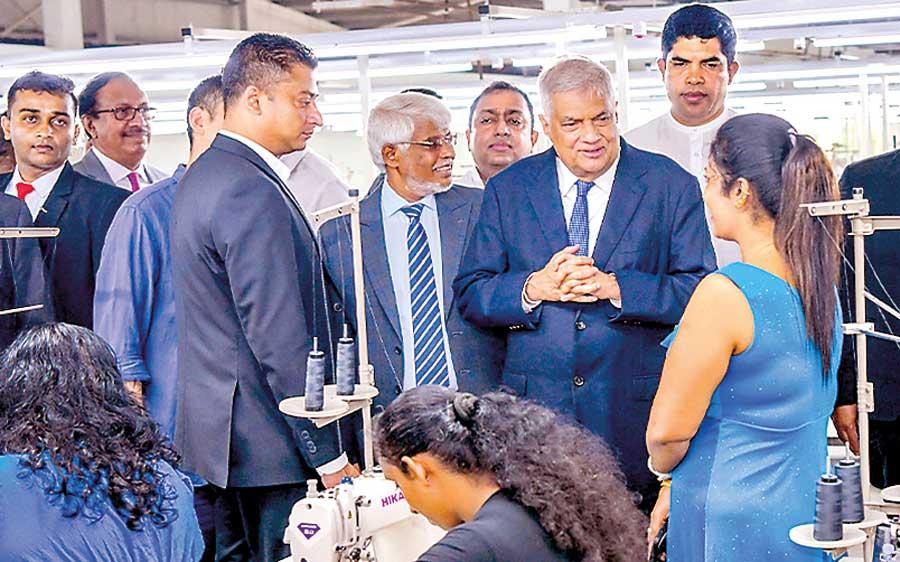Reply To:
Name - Reply Comment
- Expansion plans for the zone include developing Bingiriya, Dummalasuriya, and Madampe to metropolitan standards
- Govt. projects estimated US$ 2,600 mn export revenue along with 75,000 new job opportunities upon completion of the project

President in conversation with zone workers
With Sri Lanka’s intensified efforts towards export orientation, the government has launched initiatives to expand the Bingiriya Export Processing Zone, with an aim to broaden the investment territory in the country.
The second and third phases of the industrial zone along with its first commercial factory were inaugurated by President Ranil Wickremesinghe last Friday with plans ahead to expand it across five sectors.
“We aim to develop Bingiriya as a major economic zone in the country through the advancement of agriculture, industry, manufacturing, Information Technology, tourism, and the fishing industry. This will also develop Kuliyapitiya, Dummalasuriya, Madampe, Bingiriya, and Chilaw areas (as investments zones),” Wickremesinghe stated at the inauguration ceremony.
Expansion plans for the zone include developing Bingiriya, Dummalasuriya, and Madampe to metropolitan standards, alongside infrastructure improvements. Additionally, Iranavila, Bingiriya, and Chilaw are set to be converted into tourist zones, with the government eyeing a golf course in the Iranavila area.
Plans are also afoot for the establishment of an IT zone, while utilising the estate of the Chilaw Plantation Company for an agricultural modernisation programme.
“The Bingiriya area should be developed as an investment zone to boost the overall economy. This will also significantly improve the Pannala and Kuliyapitiya areas, and we believe that the restoration of Madampe will be achieved through these efforts,” Wickremesinghe stated on the expansion plans.
The government projects an estimated US$ 2,600 million export revenue along with 75,000 new job opportunities to be generated upon the completion of the project.
Initiated in 2018, the industrial zone was allocated an additional 1,000 acres of land by Wickremesinghe, serving as Prime Minister of the country at the time.
At the ceremony, he stressed that Sri Lanka is yet to capitalise on its export economic potential compared to its regional peers such as Vietnam, Thailand, and Indonesia.
“Even today, our import costs exceed our export earnings. If this continues, the country may face bankruptcy again in 15 years. Therefore, proper economic management should be maintained by controlling the acquisition of foreign loans,” Wickremesinghe warned.
Research findings in Sri Lanka’s commitments and progress on trade facilitation reveal that the island nation is not only falling behind other middle-income countries but also behind the least developed countries (LDCs).
Over the last six years, Sri Lanka has made very less improvements in making the country’s import and export procedures more efficient, transparent, and less costly, according to Verite Research.
This inefficiency has made significant impacts on the nation’s competitiveness of its exporters, especially small and medium-sized enterprises (SMEs), for whom higher costs and extended time taken to trade across borders have become major barriers to succeed in the international market.